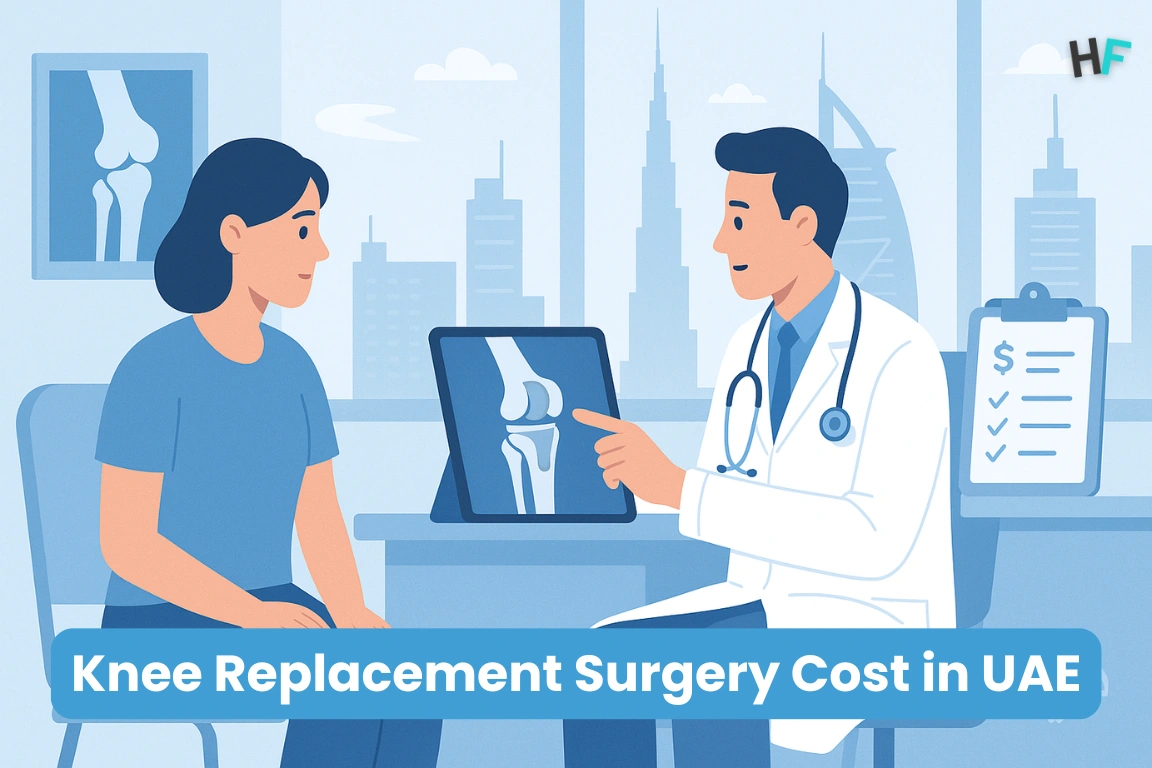Knee replacement surgery—clinically termed knee arthroplasty—is a high-frequency orthopedic intervention across the UAE, particularly in Dubai, Abu Dhabi, and Sharjah. It addresses severe joint degradation caused by advanced osteoarthritis, post-traumatic cartilage injury, or autoimmune joint disorders. As of 2025, the UAE healthcare ecosystem—governed by entities like MOHAP, SEHA, and the Dubai Health Authority—offers knee replacements through both public and private sectors, with surgical protocols aligned to global orthopedic standards.
Despite technological innovations such as robot-assisted navigation, 3D-printed implants (e.g., Zimmer Biomet, Stryker), and fast-track recovery protocols, knee replacement remains a cost-intensive procedure. Prices vary depending on multiple variables: unilateral vs. bilateral surgery, implant grade (cemented vs. cementless), surgeon expertise, and insurance coverage tiers from providers like Daman, Thiqa, AXA, or Oman Insurance.
This 2025 cost guide offers a transparent breakdown of UAE knee replacement surgery pricing, including:
- Cost differences across private and public hospitals
- What’s typically included in orthopedic surgery packages
- High-cost components: implant systems, anesthesia, inpatient care
- Coverage insights for insured UAE nationals and self-paying expats
- Rehabilitation costs: physiotherapy, home mobility aids, follow-ups
- Practical strategies to minimize expenses while preserving care quality
Whether you are an uninsured expat comparing local options, a GCC resident seeking cross-border care, or an international medical tourist evaluating UAE as a destination, this guide equips you with the financial clarity required to make outcome-focused decisions.
What Is Knee Replacement Surgery?
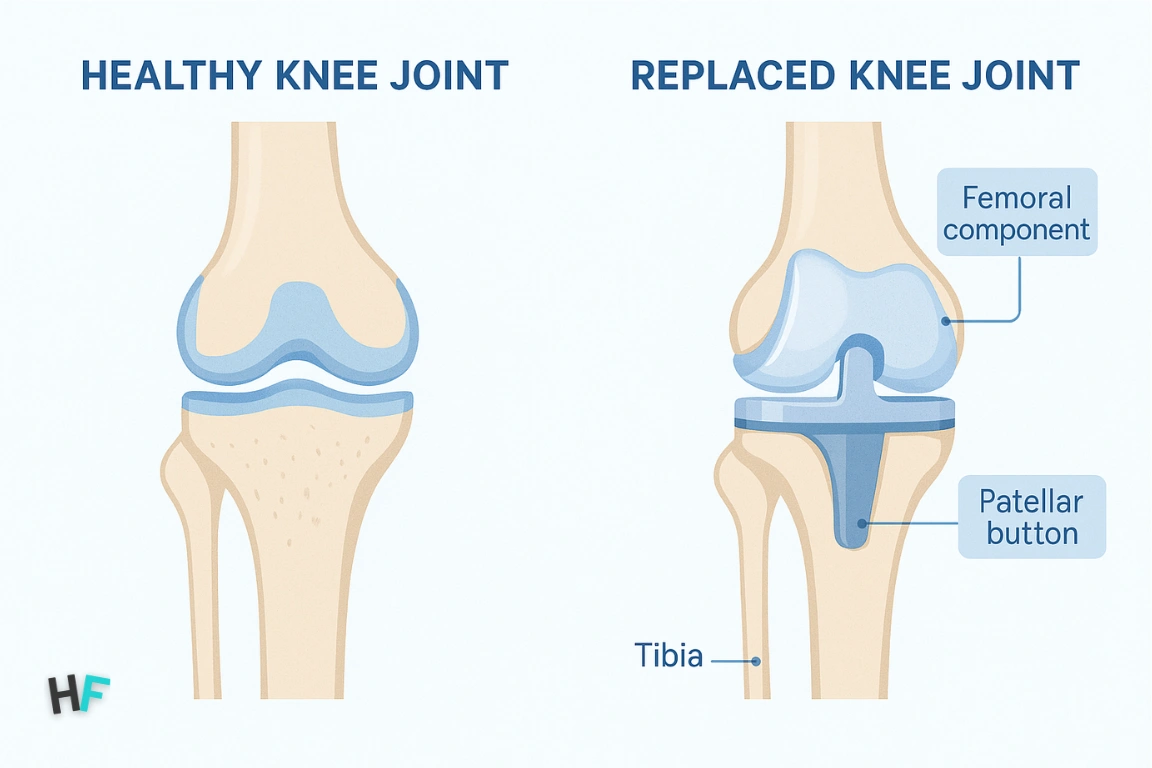
Knee replacement surgery—also called knee arthroplasty or prosthetic knee joint reconstruction—is a major orthopedic intervention that involves replacing the deteriorated articulating surfaces of the knee joint with artificial implants. These components, typically fabricated from cobalt-chromium alloys, ultra-high molecular weight polyethylene (UHMWPE), and biocompatible polymers, are engineered to restore the biomechanics of the natural knee.
The procedure is recommended for patients with Grade III–IV osteoarthritis (based on the Kellgren-Lawrence scale), post-traumatic degeneration, or autoimmune arthritides such as rheumatoid arthritis. Candidates often exhibit joint space narrowing, osteophyte formation, and functional disability despite conservative treatments like corticosteroid injections, viscosupplementation, or physical therapy.
Knee arthroplasty is subdivided into:
- Total Knee Replacement (TKR): Resurfaces all three compartments (medial, lateral, patellofemoral).
- Partial Knee Replacement (PKR): Targets only the diseased compartment, preserving healthy cartilage.
In both variants, orthopedic surgeons excise worn cartilage and a minimal layer of subchondral bone before affixing prosthetic components using cemented or cementless fixation methods (e.g., press-fit or porous coatings).
In the UAE, TKR and PKR are predominantly performed in tertiary hospitals like Cleveland Clinic Abu Dhabi, Mediclinic City Hospital, or SEHA-accredited centers. Many utilize robotic-assisted systems (e.g., ROSA Knee System, MAKOplasty) to ensure precision alignment and optimal ligament balance.
Surgery duration ranges between 60–120 minutes, followed by a hospital stay of 2–4 days. Post-operative recovery protocols often involve early mobilization, cryotherapy, DVT prophylaxis, and structured physiotherapy. Objective recovery is measured using validated scales such as the WOMAC index and KOOS (Knee Injury and Osteoarthritis Outcome Score).
Clinical data from JCI-accredited UAE hospitals show >95% success rates at 10-year follow-up when proper patient selection, implant alignment, and physiotherapy compliance are achieved. With streamlined public healthcare access via Daman or Thiqa and competitive international packages offered by private hospitals, knee replacement remains one of the most accessible and outcome-reliable surgeries in the UAE’s orthopedic landscape as of 2025.
What Are the Types of Knee Replacement Procedures?

Knee replacement surgery can be categorized into several procedure types, each tailored to the extent of joint damage, anatomical alignment, patient age, activity level, and overall bone health. In clinical orthopedic practice across the UAE, the most commonly performed procedures include Total Knee Replacement (TKR), Partial Knee Replacement (PKR), Bilateral Knee Replacement, Revision Knee Replacement, and Robotic-Assisted Knee Replacement. Each procedure serves a unique surgical indication and is associated with specific implant designs, recovery timelines, and pricing.
1. Total Knee Replacement (TKR)
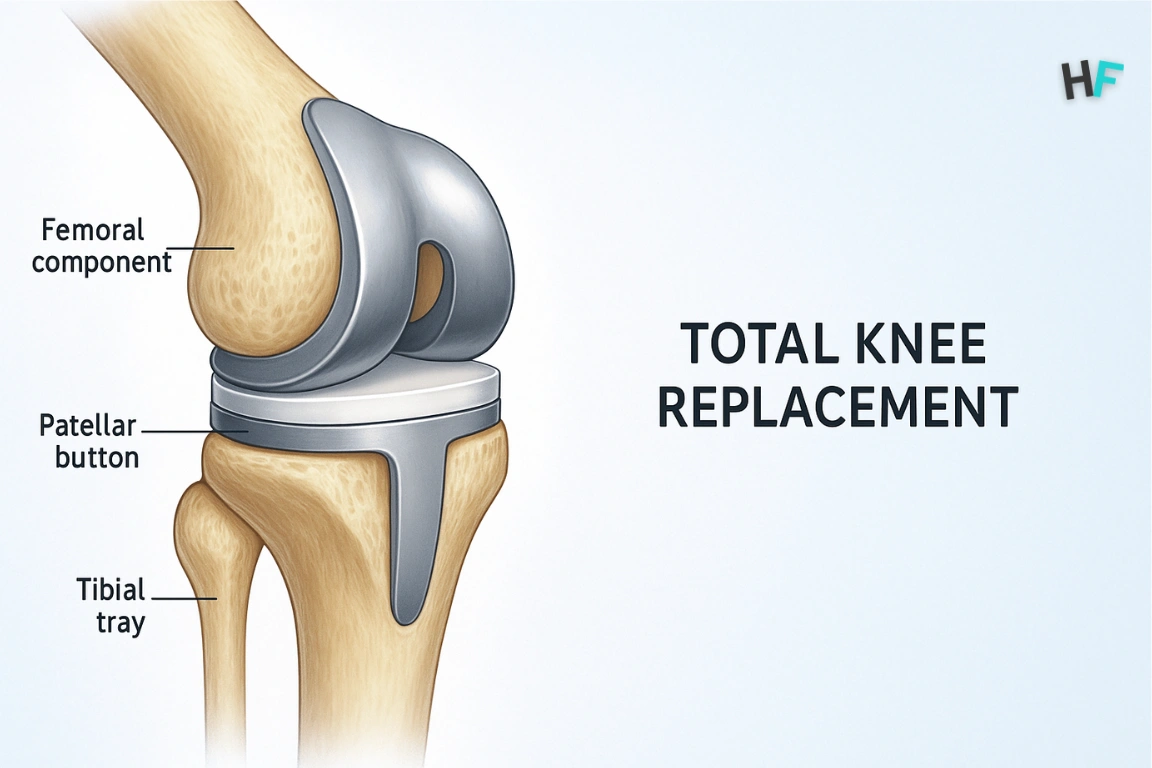
Total knee replacement is the most widely performed procedure in the UAE. In this approach, the surgeon resurfaces all three compartments of the knee: medial, lateral, and patellofemoral. The damaged cartilage and a thin layer of subchondral bone are removed from the femur, tibia, and patella, and replaced with a prosthetic joint system — typically composed of cobalt-chromium, titanium, or polyethylene components.
TKR is recommended for patients with advanced osteoarthritis, rheumatoid arthritis, or degenerative joint disease involving more than one compartment. It restores full alignment, improves range of motion, and offers 15–20 years of implant longevity with proper post-op care. The average surgical duration is 90–120 minutes, and hospital stay is usually 3–5 days. This procedure is considered the gold standard for individuals above 50 with severe pain and deformity.
2. Partial Knee Replacement (PKR)
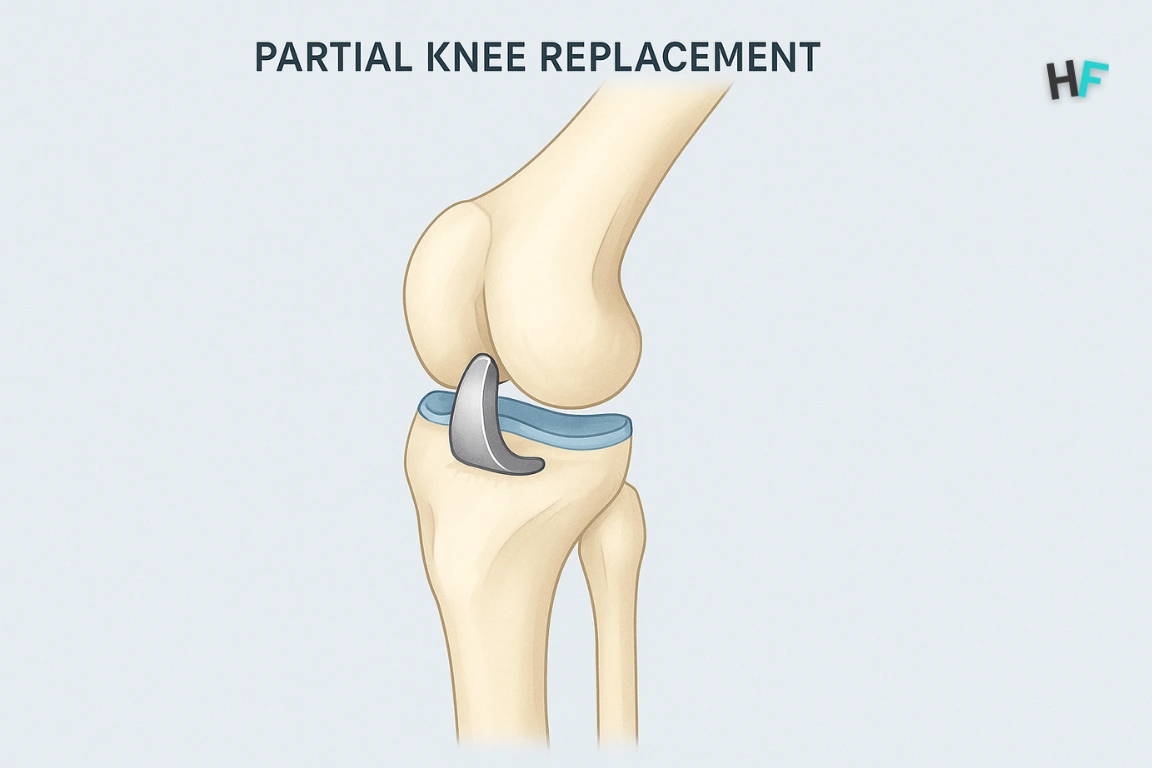
Also known as unicompartmental knee arthroplasty (UKA), this procedure targets only the affected part of the knee — usually the medial compartment. PKR involves less bone removal, smaller incisions, and preservation of the anterior cruciate ligament (ACL). As a result, patients benefit from faster recovery, reduced blood loss, and more natural joint kinematics.
Partial replacement is suitable for younger or more active patients whose arthritis is localized to a single compartment. However, strict eligibility criteria apply — including intact ligaments, minimal deformity, and absence of inflammatory arthritis. The lifespan of a partial knee implant is typically 10–15 years, and conversion to a TKR is possible if degeneration spreads.
3. Bilateral Knee Replacement
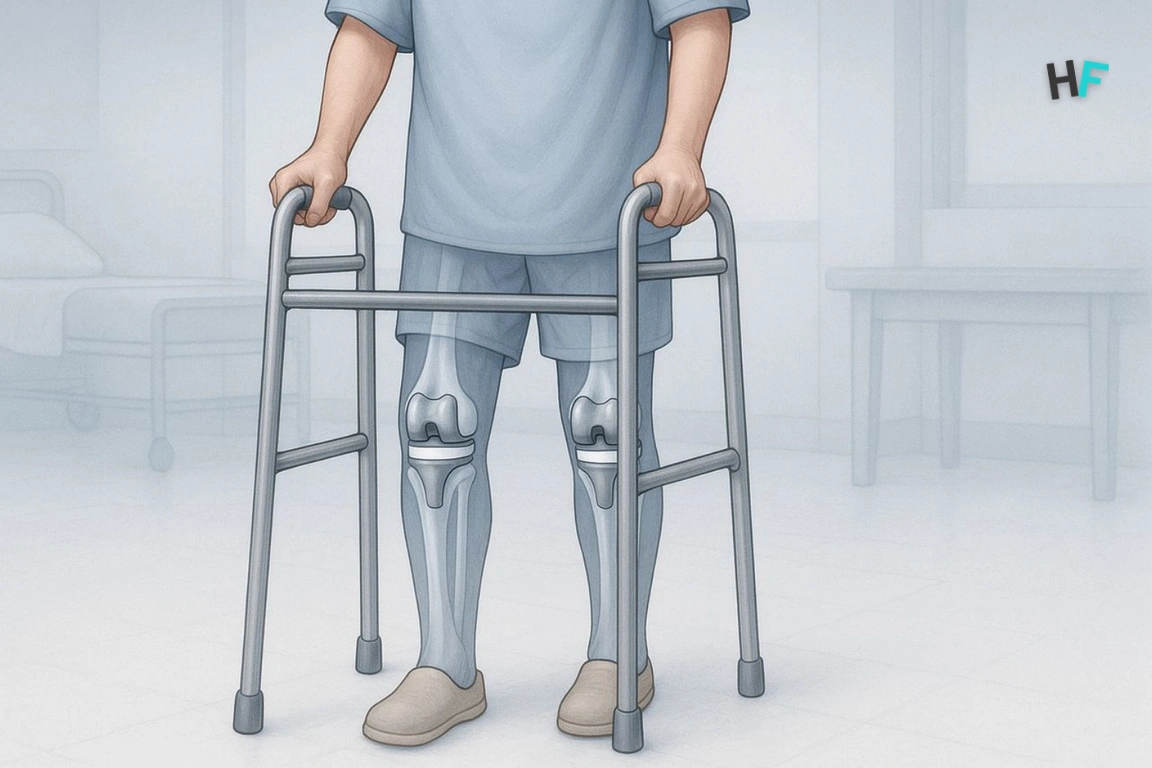
Bilateral knee replacement involves replacing both knees during a single surgical session (simultaneous) or in staged operations spaced weeks or months apart. Simultaneous bilateral TKR is efficient for patients with bilateral arthritis, good cardiac function, and strong post-op support at home.
While recovery may be longer initially, this procedure reduces total rehabilitation time, anesthesia exposure, and hospital costs when compared to two separate surgeries. However, it carries increased risks of blood clots, cardiac strain, and transfusion, especially in older patients or those with comorbidities. Most UAE hospitals assess suitability through pre-operative cardiac clearance and lab screening.
4. Revision Knee Replacement
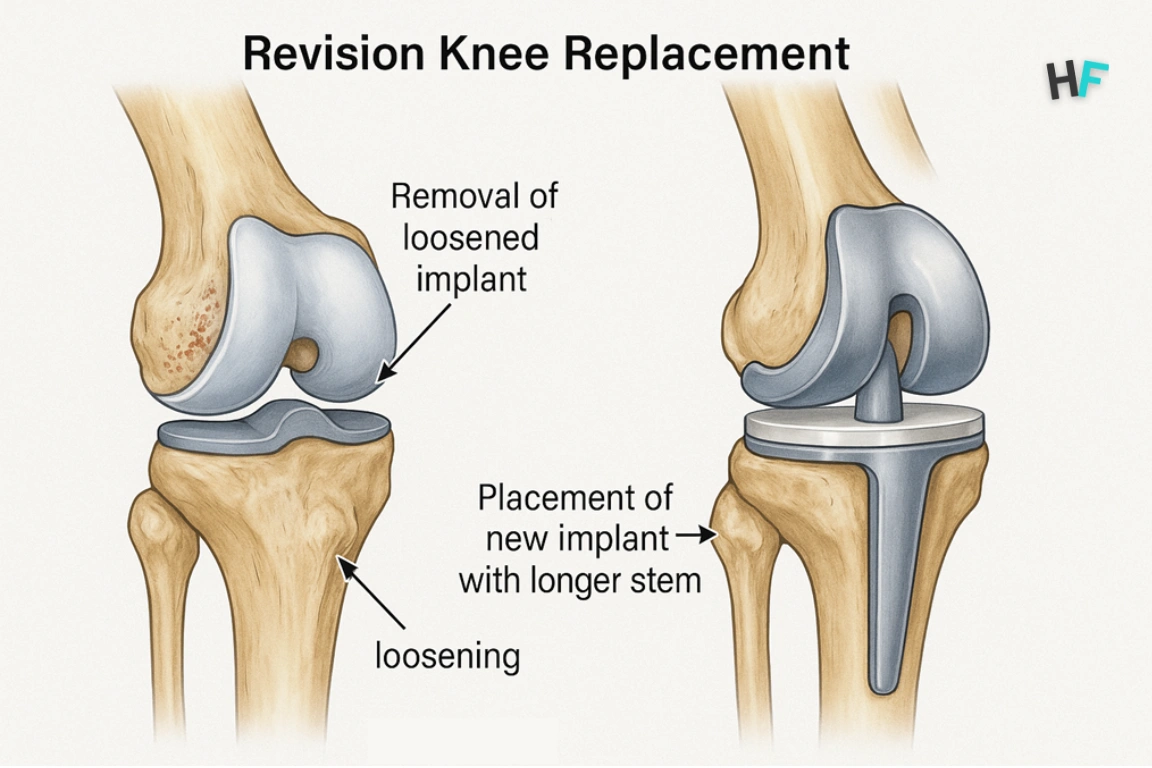
Revision knee surgery is performed when a previously implanted prosthesis fails due to loosening, infection, wear-and-tear, instability, or malalignment. This complex procedure involves removing the old components, preparing the bone for a new implant, and sometimes using metal augments, bone grafts, or constrained prosthetic systems.
Revision surgeries require experienced surgeons, advanced tools, and specialized implants. They are typically more expensive and time-consuming than primary knee replacements, with a longer hospital stay and slower recovery. Leading hospitals in Dubai and Abu Dhabi offer dedicated revision knee units with infection-control measures and advanced imaging guidance.
5. Robotic-Assisted Knee Replacement
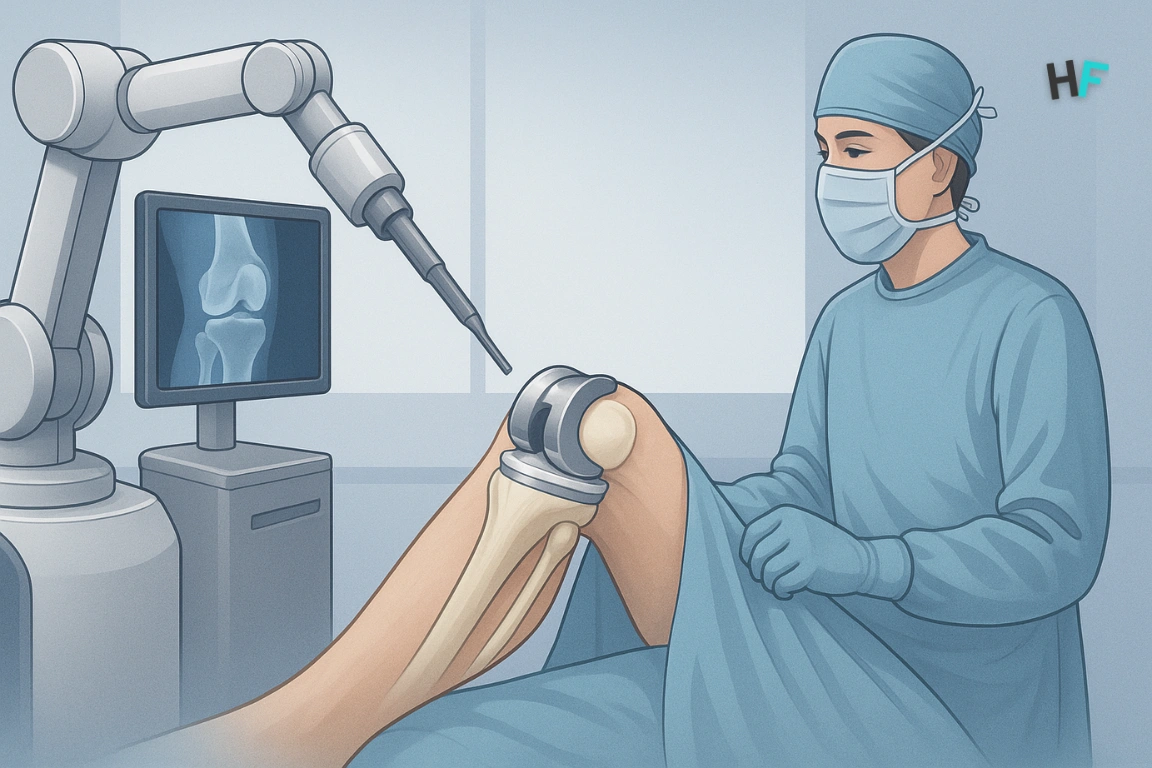
Robotic knee surgery is an emerging advancement in UAE orthopedics. Systems like MAKO, Navio, or ROSATM assist surgeons in achieving higher accuracy in bone resection, implant positioning, and soft tissue balance. A preoperative CT or MRI scan is used to map the patient’s knee in 3D, helping the robotic arm guide bone cuts with sub-millimeter precision.
The benefits of robotic-assisted TKR or PKR include reduced post-op pain, lower complication rates, quicker discharge, and better implant longevity. However, the cost is generally higher due to the use of imported technology and specialized training. Robotic surgery is currently offered in JCI-accredited hospitals in Dubai, Abu Dhabi, and Sharjah, making it ideal for patients seeking minimally invasive precision and faster recovery timelines.
Why Is Knee Replacement Surgery Done?
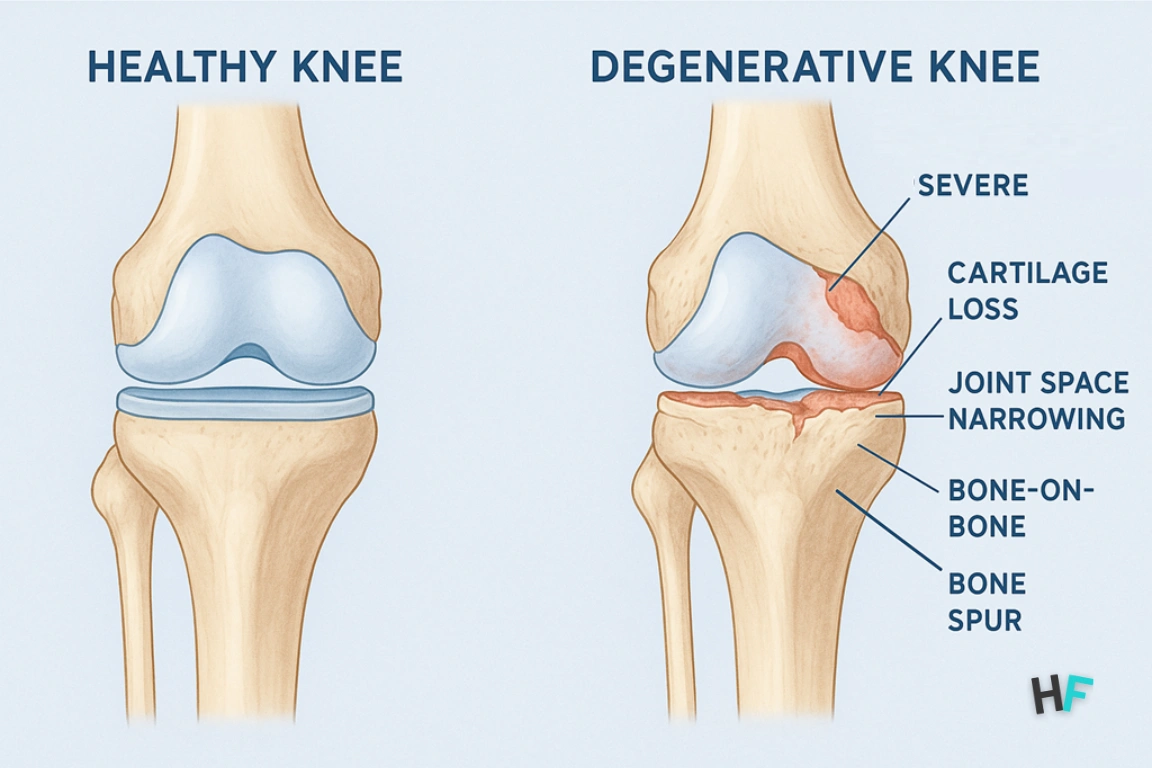
Knee replacement surgery is primarily performed to treat advanced joint degeneration, relieve chronic pain, and restore functional mobility in patients suffering from progressive knee disorders. The procedure is typically recommended when non-surgical treatments such as medications, physiotherapy, viscosupplementation, or intra-articular corticosteroid injections fail to provide lasting relief.
Knee joint deterioration can arise from various causes, but the decision to proceed with surgery is usually based on the extent of cartilage loss, joint deformity, and impact on quality of life. In the UAE, orthopedic surgeons often follow standardized radiological and clinical criteria, including the Kellgren-Lawrence Grading Scale, Oxford Knee Score, and weight-bearing X-rays to determine surgical eligibility.
Common Medical Conditions Leading to Knee Replacement
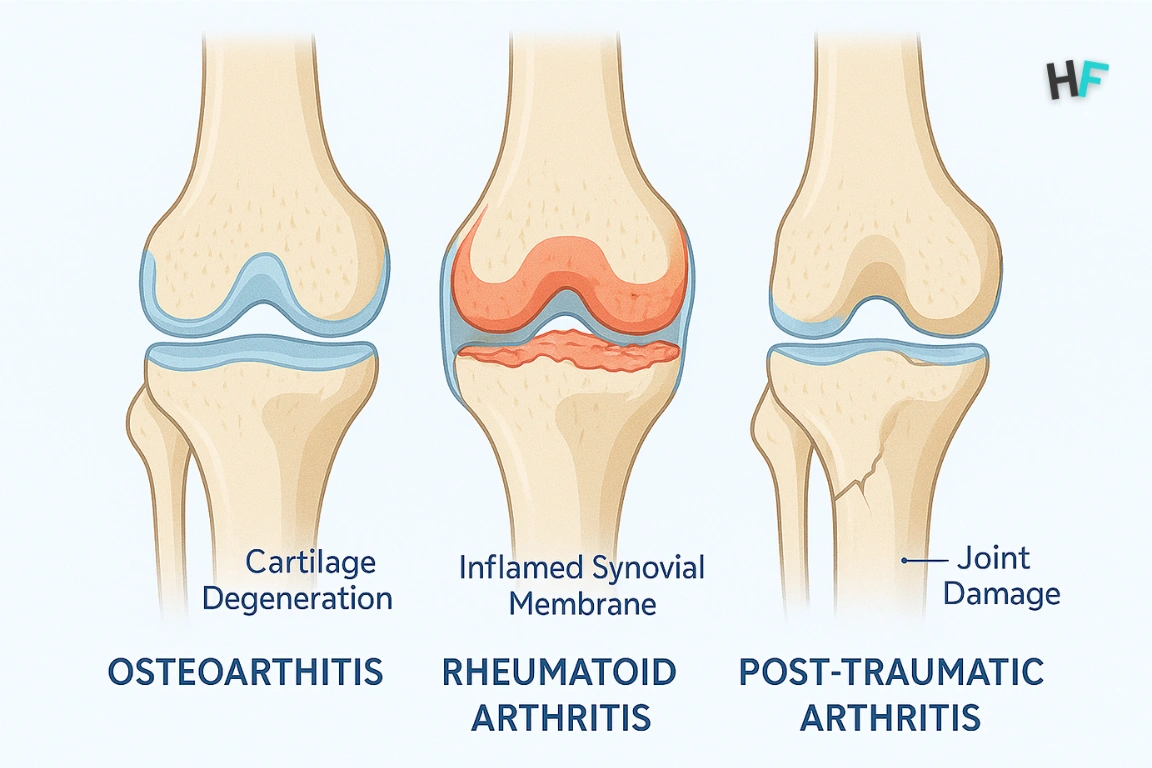
1. Osteoarthritis (OA) – Degenerative Joint Disease
Osteoarthritis is the most common indication for total or partial knee replacement in the UAE. It occurs when the protective cartilage that cushions the bones wears down over time, leading to bone-on-bone friction, osteophyte formation, and synovial inflammation. Patients typically experience:
- Morning stiffness that lasts <30 minutes
- Persistent pain during movement
- Joint swelling and crepitus
- Varus or valgus deformity
As OA progresses from Grade 2 to Grade 4, conservative options become less effective, and surgical replacement becomes the definitive intervention.
2. Rheumatoid Arthritis (RA) – Autoimmune Joint Destruction
In patients with RA, the immune system attacks the synovial lining of the joint, resultinronic inflammation, cartilage erosion, and joint deformity. Although mog in chdern disease-modifying antirheumatic drugs (DMARDs) slow progression, many patients eventually require knee arthroplasty due to:
- Severe synovitis
- Ligament laxity
- Joint instability
RA patients require careful perioperative planning due to higher risks of poor wound healing and systemic complications.
3. Post-Traumatic Arthritis
Previous injuries — such as ACL tears, meniscal damage, or fractures involving the tibial plateau or femoral condyle — can lead to long-term joint instability and secondary arthritis. In these cases, joint wear accelerates due to altered biomechanics, often requiring unilateral or revision knee replacement years after the original injury.
4. Avascular Necrosis (AVN) of the Femoral Condyle
AVN occurs when blood supply to the bone is interrupted, leading to bone tissue death and eventual collapse. Common causes include long-term steroid use, alcohol abuse, and trauma. Knee replacement restores joint function in AVN cases by replacing the necrotic surface with a durable implant.
5. Congenital or Structural Deformities
Certain congenital abnormalities or structural malalignments, such as genu varum (bow-leggedness) or genu valgum (knock knees), can lead to uneven weight distribution and focal cartilage loss. In progressive or symptomatic cases, joint replacement surgery helps correct deformity and redistribute load-bearing forces.
How Much Does Knee Replacement Surgery Cost in UAE?
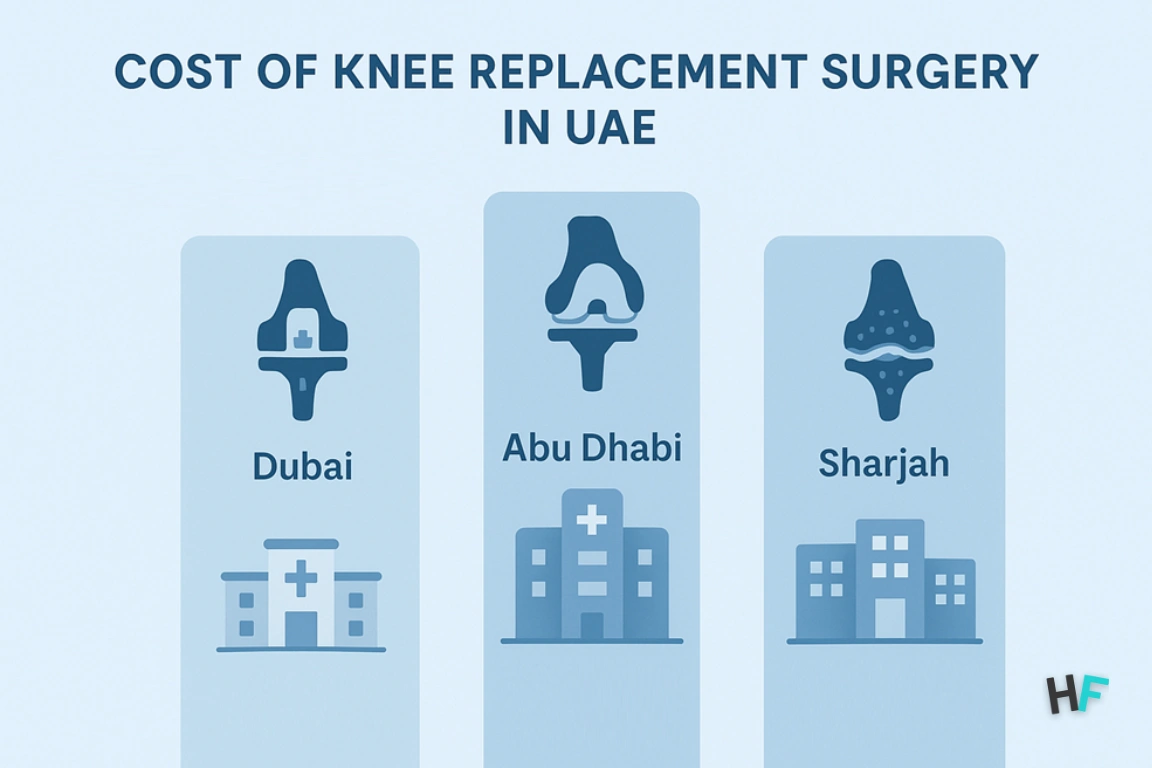
Knee replacement surgery in the UAE varies significantly in cost depending on several clinical, procedural, and institutional factors. The price spectrum reflects not just the surgical technique and implant material but also hospital grade, surgeon expertise, rehabilitation provisions, and whether the replacement is unilateral or bilateral. Patients in Dubai, Abu Dhabi, and Sharjah—especially medical tourists—often encounter diverse package models that bundle diagnostics, surgery, recovery, and post-op care.
The average cost of a unilateral total knee replacement in the UAE typically ranges from AED 33,000 to AED 120,000 (USD 9,000–32,700). Bilateral replacements cost significantly more, ranging from AED 65,000 to AED 145,000 (USD 17,700–39,500), based on facility type, implant sophistication (standard vs robotic), and whether rehab is included.
Most high-end hospitals in Dubai and Abu Dhabi, such as Mediclinic, Burjeel, King’s College Hospital, and Saudi German, offer all-inclusive orthopedic packages targeting international patients. These often include pre-op imaging, joint consultation, advanced implants (titanium, ceramic, or robotic-guided), hospital stay, anesthesia, physiotherapy, medications, and follow-ups. In contrast, community-level hospitals and medical tourism aggregators (like Lyfboat or PlacidWay) offer more affordable yet standardized surgery packages, catering to budget-sensitive patients with fewer add-ons.
Besides the base price, knee replacement patients must also factor in:
- Type of procedure: Partial vs total, unilateral vs bilateral.
- Implant brand & durability: Zimmer, Stryker, or robotic variants often cost more.
- Length of hospital stay: 2–5 days standard; extended stays cost extra.
- Post-op rehabilitation: Some hospitals include 5–10 sessions; others charge separately.
- Pre-existing health issues: Conditions like obesity, diabetes, or hypertension may require pre-surgical optimization, lab panels, and ICU readiness.
Despite the cost variations, UAE remains a trusted orthopedic destination with modern surgical infrastructure, minimal waiting time, and English-speaking joint-replacement specialists. Patients flying in for medical tourism should always seek itemized quotes, confirm implant types, and ensure JCI or DOH-accredited facilities to avoid post-operative complications or hidden costs.
| Package Type | Hospital / Provider | Cost (AED) | Cost (USD) | Inclusions | Add-ons | Ideal For |
|---|---|---|---|---|---|---|
| Premium Private (Unilateral) | King’s College Hospital Dubai | 85,000 – 120,000 | 23,100 – 32,700 | Pre-op tests, surgery, titanium implant, 4-day stay, physiotherapy, meds | Additional physio, deluxe suite, ICU stay | Medical tourists, chronic joint cases, insurance-covered |
| Bilateral Premium Package | Mediclinic (Dubai / Abu Dhabi) | 120,000 – 145,000 | 32,700 – 39,500 | Both knees, premium implant, imaging, 5-day stay, rehab sessions | Airport pickup, hotel stay, caregiver assistant | Overseas patients needing full replacement |
| Mid-Tier Surgical Bundle | Saudi German Hospital | 60,000 – 75,000 | 16,300 – 20,400 | Surgery, anesthesia, standard implant, 2–3 day stay, basic rehab | Robotic upgrade, semi-private room | Residents or expats with moderate budget |
| Introductory/Discount Package | Thumbay Hospital Dubai | 33,000 | 9,000 | Basic implant, single knee, shared room, standard anesthesia | Physiotherapy, upgraded implants | Self-paying locals, budget-sensitive patients |
| Medical Tourism Aggregated | Lyfboat / PlacidWay Network | 40,000 – 73,000 | 10,900 – 19,900 | Pre-eval, surgery, hotel stay, translator, implants | Choice of city/hospital, longer rehab | International patients using bundled care coordination |
| Robotic-Assisted Knee Surgery | DRHC (Dubai Robotic Knee Center) | 100,000 – 130,000 | 27,200 – 35,400 | Mako robotic surgery, 3D implant planning, premium Zimmer implants | Gait training, luxury suite | Patients seeking latest robotic and precision-based surgery |
What Are the Main Cost Factors for Knee Replacement in UAE?
The cost of knee replacement surgery in the UAE is influenced by a range of interconnected factors — from hospital type and implant technology to surgeon experience and post-op rehabilitation inclusions. Understanding these variables allows patients, caregivers, and medical tourists to make informed, cost-efficient, and outcome-driven decisions.
Here’s a breakdown of the most significant cost-determining components in UAE orthopedic care:
| Cost Factor | Typical Impact (AED) | Explanation |
|---|---|---|
| Hospital Tier | +20%–40% overall | JCI-accredited hospitals (e.g., Mediclinic, King’s) charge more due to advanced infrastructure and international standards. |
| Implant System & Brand | 10,000–25,000 | Brands like Zimmer, Stryker, and high-flex titanium implants elevate cost due to durability and biomechanics. |
| Surgeon Fees | 8,000–20,000 | Highly experienced surgeons, especially UK/US-trained or robotic-certified, command premium charges. |
| Robotic Surgery Upgrade (MAKO/ROSA) | 12,000–22,000 | Adds surgical precision via 3D CT or MRI planning, improving outcomes and implant alignment. |
| Private Room (3 Days) | 4,500–9,000 | Enhances recovery environment; includes faster nurse call response and more visitor access. |
| Diagnostics & Medical Clearance | 2,000–6,000 | Covers mandatory lab tests, ECG, X-rays, and clearance by internal medicine or cardiology if needed. |
| Post-Op Physiotherapy (2–4 weeks) | 1,500–10,000 | Rehabilitation is critical for recovery; cost depends on in-hospital vs. private rehab center settings. |
| Medical Tourism Add-Ons (optional) | 3,000–10,000 | Includes visa processing, hotel stay, airport pickup, translation support, or family care arrangements. |
What’s Included in a Knee Surgery Package in UAE?
Knee replacement packages in the UAE are typically marketed as comprehensive bundled procedures, combining surgical fees, hospital stay, and basic aftercare into a single quote. However, not all packages are equal — inclusions can vary dramatically between standard, premium, and medical tourism packages. Knowing what’s inside the package — and what’s billed separately — is essential for accurate cost planning.
What’s Included in Standard & Premium Knee Replacement Packages?
| Component | Standard Incusion | Premium-Only (Optional) | Estimated Extra Cost (AED) | Notes |
|---|---|---|---|---|
| Surgical Team & OR Charges | Surgeon, Anesthetist, Nursing, OT Consumables | – | – | Included in all packages (TKR/PKR) |
| Knee Implant System | Cemented standard prosthesis (e.g., Zimmer) | Gender-specific, high-flex, mobile-bearing | 5,000 – 20,000 | Confirm implant model before booking |
| Hospital Stay | 2–4 days in semi-private/shared room | Private or VIP executive room (en-suite) | 1,500 – 7,500/day | Private rooms improve recovery, comfort, and caregiver access |
| Pre-Op Diagnostics | Bloods, ECG, X-ray, COVID test | MRI / CT scan for robotic surgery planning | 500 – 3,000 | Robotic surgery always requires 3D mapping |
| Robotic Surgical Guidance | – | MAKO / ROSA with AI-guided precision | 10,000 – 22,000 | Available only in select JCI hospitals |
| Post-Op Medication & Care | Basic in-hospital pain relief + antibiotics | Personalized drug plan, anticoagulation review | Varies | ICU care or infection complications billed separately |
| In-Hospital Physiotherapy | 1–2 sessions with mobility training | 5–10 sessions, robotic rehab, hydrotherapy | 2,500 – 8,000 | Clarify if outpatient rehab is included |
| Discharge & Medications | Printed discharge report, 5–7 days’ meds | Digital files, online portal access | – | Discharge kits standard in all facilities |
| VIP / International Services | – | Translator, visa help, airport pickup/drop | 3,000 – 10,000 | Ideal for medical tourists |
| Insurance & Claims Help | – | Fast-track processing, dedicated liaison | – | Premium support in international patient centers |
What’s Not Always Included — Confirm Before Surgery
| Component | Not Always Included | Estimated Extra Cost (AED) | Notes |
|---|---|---|---|
| Robotic or 3D Surgical Navigation | Often not included in standard plans | 10,000 – 22,000 | Only at MAKO/ROSA-equipped facilities |
| Outpatient Physiotherapy (3–4 weeks) | May not be covered post-discharge | 2,500 – 8,000 | Request session breakdown & location options |
| Extended Hospital Stay (>4 days) | Room extensions billed daily | 1,500 – 3,000/day | ICU stay or post-op delays raise stay duration |
| Custom / Imported Implants | Non-standard brands or rare sizes | 5,000 – 20,000 | Common in complex anatomy or re-surgeries |
| Complication Management | Not bundled; charged separately | Varies (up to 25,000+) | Infections, blood transfusions, ICU recovery, surgical revisions |
| Return Flights / Hotel Stay | Booked independently | 2,000 – 4,000 | Medical tourism companies can assist |
| Advanced Imaging (CT/MRI) | Extra unless required for robotic planning | 1,000 – 3,000 | Not all hospitals offer in-house scans |
| VIP Room or Family Suite | Luxury en-suite upgrades | 3,500 – 7,500/day | Includes enhanced food service, private nurse access |
| Insurance Filing Assistance | Manual process unless premium concierge included | – | Premium patients get dedicated claim support |
Is Knee Surgery Covered by Insurance in UAE?
Yes, knee surgery is often covered by insurance in the UAE if it is deemed medically necessary by a licensed orthopedic surgeon. In Dubai and Abu Dhabi, most enhanced and comprehensive insurance plans—such as those from Daman, Thiqa, and AXA—cover knee replacement procedures partially or fully, especially when prescribed due to osteoarthritis or trauma. However, elective or cosmetic knee procedures may be excluded unless explicitly stated in the policy benefits.
Does Daman Insurance Cover Knee Replacement Surgery in the UAE?
Daman insurance in the UAE typically covers knee replacement surgery under Enhanced and SEHA plans. Patients seeking treatment at in-network facilities like Mediclinic or SEHA-affiliated hospitals usually benefit from full or significant reimbursement, provided pre-authorization and referral protocols are followed. Basic plans may exclude inpatient rehab or post-op physiotherapy.
Is Robotic Knee Surgery Covered by UAE Health Insurance?
Robotic-assisted knee surgery may be partially covered by UAE health insurance if medically justified. While insurers like MetLife or Aetna may approve robotic knee replacement based on documented need and cost-effectiveness, additional approvals are often required. Coverage may also depend on whether the hospital offers the robotic technique as part of standard care or as a premium add-on.
Do All UAE Health Plans Include Post-Surgery Physiotherapy for Knee Replacement?
Not all health plans in the UAE include full coverage for post-knee replacement physiotherapy. High-tier policies often cover outpatient rehab sessions and home physiotherapy, especially for Emiratis under Thiqa or patients with employer-sponsored comprehensive plans. In contrast, many basic or individual plans cap the number of physio sessions or apply co-pay clauses.
How Can I Check If My Insurance Covers Knee Surgery in the UAE?
You can check if your insurance covers knee surgery in the UAE by reviewing your benefits summary and contacting your TPA or insurer directly. Use your Emirates ID or insurance card to access your policy online or visit the hospital’s insurance desk. It’s essential to confirm pre-authorization steps, referral chains, and any exclusions on implants or advanced surgical techniques.
How to Choose the Right Orthopedic Surgeon in UAE?

Selecting the right orthopedic surgeon in the UAE is a clinical decision and a long-term investment in your mobility, comfort, and surgical outcome. A good surgeon ensures not only a successful implant placement but also minimizes post-op complications, enhances recovery timelines, and offers continuity of care throughout physiotherapy and follow-up.
The most qualified knee surgeons in the UAE are typically DHA or MOHAP licensed, fellowship-trained in arthroplasty or sports medicine, and affiliated with tier-1 hospitals or specialized orthopedic centers. These specialists often handle complex cases like revision TKR, bilateral knee replacement, or robotic-assisted surgery. Credentials to look for include:
- Board certification (FRCS, American Board, DNB Ortho)
- Fellowship in Joint Replacement or Minimally Invasive Surgery
- Membership in international orthopedic associations (AAOS, BOA)
Experience plays a crucial role. Surgeons performing 100+ TKRs annually often have better complication management protocols, shorter operation durations, and more predictable implant longevity. A key predictor of outcome is whether the surgeon follows evidence-based protocols and works within a multidisciplinary team, including anesthetists, rehab specialists, and infection control consultants.
Patients should also assess the surgeon’s hospital privileges. Facilities like Cleveland Clinic Abu Dhabi, King’s College Hospital Dubai, and Mediclinic City Hospital often attract internationally trained surgeons and provide access to robotic suites, enhanced operating rooms, and ICU backup. This ecosystem enhances safety and postoperative monitoring, especially in patients with diabetes, obesity, or cardiac conditions.
Equally important is the surgeon’s willingness to educate the patient. Transparent explanation of risks, implant types, recovery pathways, and cost breakdowns is a green flag. Surgeons who push robotic surgery or premium implants without proper clinical indication should be approached with caution.
Online reputation matters — but not in isolation. Verified reviews, peer recommendations, and surgical audit reports (where available) provide triangulated insight. Patients may also request:
- Before/after patient mobility case studies
- Implant brand registration documents
- 3D templating or surgical plan previews
In short, the right orthopedic surgeon in the UAE balances technical mastery with patient-centered communication, operates within a trusted hospital environment, and customizes treatment protocols based on anatomy, comorbidities, and long-term quality of life goals.
What Are the Best Hospitals for Knee Surgery in UAE?
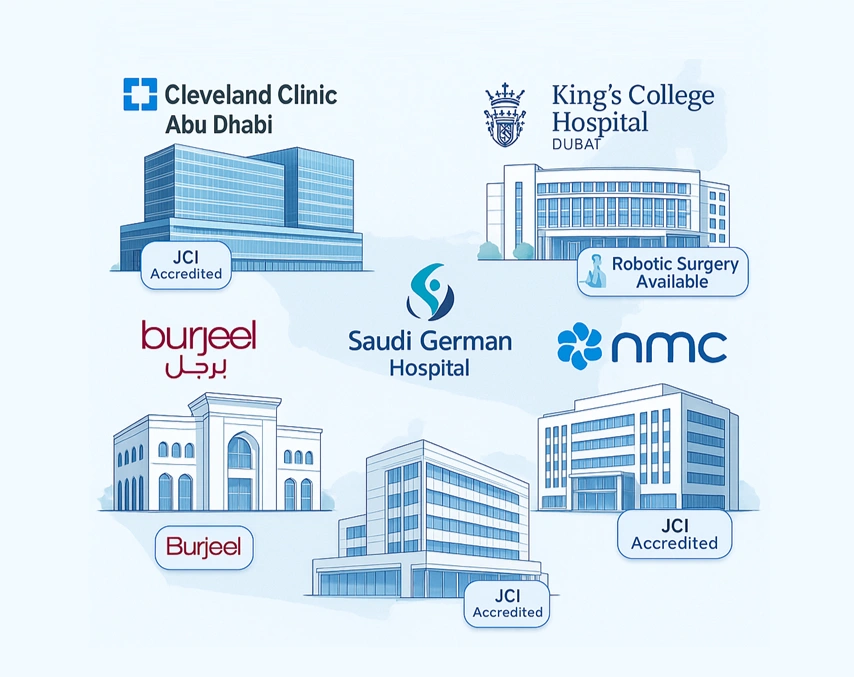
Choosing the right hospital for knee replacement surgery in the UAE is not just a matter of cost — it’s a function of surgical volume, technological advancement, orthopedic subspecialization, and continuity of rehabilitation support. The country’s top facilities integrate global expertise with regional medical compliance, offering patients both clinical excellence and comfort.
Whether you’re a UAE resident comparing insurance options or a medical tourist seeking advanced care, here are the hospitals consistently ranked highest for Total Knee Replacement (TKR), Partial Knee Replacement (PKR), and robotic-assisted joint surgeries:
| Hospital Name | Technology | Surgeon Origin | Robotic TKR | Rehab Program | Insurance Friendly |
|---|---|---|---|---|---|
| King’s College London (Dubai) | MAKO | UK | Yes | Yes | Yes |
| Mediclinic City Hospital | ROSA | Europe | Yes | Yes | Yes |
| Saudi German Hospital Dubai | Standard | India/ME | No | Yes | Yes |
| Cleveland Clinic Abu Dhabi | MAKO + AI | US | Yes | Yes | Limited (Private) |
| NMC Royal Hospital (Abu Dhabi) | Custom | India/UK | No | Yes | Yes |
| UHS Sharjah | Basic | UAE-based | No | Yes | Yes |
Still Deciding? Explore Verified Listings at HealthFinder.ae Orthopedic Surgeons in Dubai
What Is the Recovery Timeline After Knee Replacement Surgery?
The recovery timeline after knee replacement surgery in the UAE is structured into phases of functional restoration, driven by hospital protocols, implant type, physiotherapy intensity, and patient-specific variables like age, BMI, comorbidities, and motivation. Most patients experience functional walking by 6–8 weeks, with complete musculoskeletal and neuromotor integration expected within 6 to 12 months.
Hospitals in Dubai and Abu Dhabi typically follow a four-phase orthopedic recovery protocol, aligned with global benchmarks (AAOS, NICE UK, and Mayo Clinic standards).
Knee Replacement Recovery Timeline by Phase (UAE Patients)
| Recovery Phase | Timeframe | Key Milestones | ROM Target | Mobility Aid | Functional Outcome |
|---|---|---|---|---|---|
| Phase 1: Immediate Post-Op | Day 0 – Day 14 | Standing & walking with walker, pain control, DVT prevention, early ROM | 0° – 70° by Day 10 | Walker → Cane (by Day 10–14) | Hospital discharge, sit-to-stand ability, cane initiation |
| Phase 2: Early Rehab & Independence | Week 3 – Week 6 | Physiotherapy, wound healing, basic ADLs, home exercise protocol | 90° – 100° flexion | Cane → Independent walking | Indoor mobility, stairs with railing, return to self-care |
| Phase 3: Strength & Reintegration | Week 7 – Week 12 | Strength training, gait retraining, neuromuscular coordination | 110°+ goal | No aid or occasional cane | Outdoor walking, desk job readiness, stair mastering |
| Phase 4: Full Recovery & Function | Month 4 – Month 12 | Balance drills, sport reintegration, prayer position ability, lifestyle adaptation | 120°+ for cultural use | None | Return to normal activities, low-impact sport, long-term ROM |
Knee Replacement Recovery Milestones – What to Expect Post-Surgery (UAE)
| Milestone | Expected Timeframe (Post-Surgery) |
|---|---|
| Standwith walker | Day 1–2 |
| Discharge from hospital | Day 3–5 |
| Walk indoors (with cane) | Week 2–3 |
| Walk outdoors (independent) | Week 6–8 |
| Return to desk work | Week 8–10 |
| Climb stairs with alternating feet | Week 10–12 |
| Sit cross-legged or partial squat | Month 6–9 |
| Return to low-impact sports (e.g. swimming, cycling) | Month 6–12 |
Factors Influencing Knee Replacement Recovery Outcomes in the UAE
| Factor | Positive Predictor | Delaying Risk |
|---|---|---|
| BMI & Age | Physically fit, under 65 years | Obesity (BMI >30), aged over 75 |
| Surgical Technique | Robotic or Minimally Invasive (MIS) | Traditional open surgery with large incisions |
| Physiotherapy Access | 2–3 in-clinic sessions/week + home protocol | Inconsistent follow-up, lack of guided rehab |
| Comorbidities | No diabetes, cardiac, or joint complications | Diabetes, osteoarthritis, heart/lung conditions |
| Motivation Level | Goal-focused, follows PT plans actively | Fear of pain, sedentary lifestyle, low discipline |
How to Prepare for Knee Replacement Surgery in UAE?
Knee replacement surgery is not a same-day decision—it’s a planned orthopedic intervention requiring both medical optimization and functional conditioning. UAE hospitals follow global best practices by requiring pre-operative screening, lab diagnostics, and patient conditioning protocols to reduce post-op complications and improve surgical outcomes.
If you’ve been advised total or partial knee arthroplasty in the UAE, here’s how to prepare effectively:
1. Medical Clearance & Diagnostic Investigations
Before surgery, patients must receive clearance from a physician to assess anesthesia risk and overall readiness. The pre-op workup includes:
| Test / Investigation | Purpose |
|---|---|
| CBC, Blood Sugar, Creatinine | Evaluates infection risk, kidney function, and diabetic control prior to anesthesia |
| ECG & Echocardiogram | Screens for cardiac abnormalities and anesthesia fitness, especially in older patients |
| Chest X-ray / Lung Function | Mandatory for patients with a smoking history or respiratory conditions (asthma, COPD) |
| Knee X-ray / MRI | Assesses joint alignment, cartilage wear, and compatibility for implant positioning |
| Coagulation Profile (PT, INR, aPTT) | Checks clotting efficiency to minimize bleeding risks during and after surgery |
In hospitals like Cleveland Clinic Abu Dhabi or Burjeel Hospital, all of these are bundled into a surgical workup package, typically done 1 week prior to the operation.
2. Pre-Surgical Physiotherapy (“Prehab”)
Also known as prehabilitation, this is a strengthening program started 2–4 weeks before surgery, especially recommended in UAE hospitals for faster post-op mobility.
| Goal of Prehab | Benefits |
|---|---|
| Strengthen quadriceps, glutes, hamstrings | Improves walking speed, reduces limp, and accelerates recovery post-surgery |
| Improve knee joint flexibility (ROM) | Reduces risk of joint stiffness and enhances range of motion after surgery |
| Train with walker or cane | Builds confidence in mobility aids and ensures safer early ambulation |
| Educate about post-op expectations | Boosts psychological readiness and helps set clear, realistic recovery goals |
Evidence from UAE physiotherapy clinics shows that patients who complete 6–10 prehab sessions reduce hospital stay by 1–2 days.
3. Pre-Operative Lab Work and Imaging
Here’s a checklist of the mandatory pre-surgical diagnostics done 3–7 days before surgery:
| Test | Normal Range / Comment |
|---|---|
| CBC (Hemoglobin, WBC, Platelets) | Ensures no anemia, clotting risk, or infection markers before surgery |
| Fasting Blood Sugar / HbA1c | Must be within controlled range; uncontrolled diabetes increases infection risk |
| ECG / ECHO | Evaluates heart rhythm and function; essential for anesthesia clearance |
| X-Ray Knee (AP & Lateral) | Assesses extent of cartilage wear, deformity angle, and implant planning |
| Hepatitis B, C & HIV Panel | Mandatory in UAE for all surgical candidates; ensures infection control protocols |
If you have uncontrolled diabetes, high blood pressure, or a history of cardiac issues, your surgery may be postponed until these conditions are stabilized.
What to Expect After the Knee Replacement Surgery?
Knee replacement isn’t just a surgery—it’s a transformation journey that unfolds over weeks and months. Knowing what to expect after the operation allows patients in the UAE to mentally prepare, set realistic recovery goals, and avoid post-op anxiety.
From pain management to mobility milestones, here’s a deep dive into what happens once the surgical dressing is applied and the anesthesia wears off.
1. Pain Levels: First 72 Hours to First Few Weeks
Post-operative pain is expected, but it’s well-managed through modern protocols in UAE hospitals. Pain intensity peaks during the first 48–72 hours and then steadily declines.
| Timeframe | Pain Management Techniques |
|---|---|
| 0–72 hours (Immediate Post-Op) | IV analgesics (e.g., morphine, fentanyl), epidural anesthesia, cryotherapy (cold packs) to control acute surgical pain |
| Day 3–7 | Transition to oral painkillers like paracetamol, NSAIDs (ibuprofen), and mild opioids (tramadol); ice therapy continues post-discharge |
| Week 2–4 | Pain mainly during physiotherapy or movement; managed with PRN medications, stretching, and local cold compresses |
Hospitals like King’s College Dubai and Burjeel Abu Dhabi often use multimodal pain management, combining regional anesthesia with medications for minimal side effects.
2. Walking with Aids: Gradual Independence
Mobility is typically initiated within 24 hours post-surgery under supervision. Most UAE-based orthopedic centers prioritize early ambulation to prevent clots and accelerate circulation.
| Timeline | Mobility Status |
|---|---|
| Day 1–2 | Assisted standing and first steps using a walker under supervision |
| Week 1–2 | Short indoor walks with walker or cane; gradually increasing endurance |
| Week 3–4 | Transition to cane or walking independently; improved balance and leg strength |
| Week 6+ | Unassisted outdoor walking; able to manage stairs and longer distances |
3. Long-Term Results & Mobility Goals (Month 3–12)
Total knee replacement is designed to restore pain-free mobility and correct deformity. While the initial 6 weeks focus on function, the long-term outcomes are about returning to normal life.
| Goal | Expected Timeline |
|---|---|
| Walk unaided indoors | By Week 6–8 |
| Climb stairs with alternating feet | By Week 10–12 |
| Drive car again | By Month 2–3 (leg-specific) |
| Sit cross-legged / floor sitting | Month 6–9 (with flexibility training) |
| Return to recreational activity | Month 6–12 (e.g., cycling, golf, walking clubs) |
In UAE climate, heat therapy (soaking, hot pads) is commonly used alongside physiotherapy to relax muscles and improve post-exercise pain relief.
How to Reduce Knee Replacement Cost in the UAE Without Compromising on Quality?
While knee replacement is a significant investment in your mobility and quality of life, there are smart ways to reduce the financial burden without sacrificing surgical excellence or post-operative outcomes. Patients in the UAE have several high-quality, cost-conscious options at their disposal.
1. Opting for All-Inclusive Surgical Package Deals
Many JCI-accredited hospitals in Dubai, Abu Dhabi, and Sharjah offer fixed-price knee replacement packages that cover:
- Pre-operative consultations and diagnostics
- Surgeon fees and anesthesia
- Implants and consumables
- Post-op hospital stay and physiotherapy sessions
| Provider | Starting Cost (AED) | Key Inclusions |
|---|---|---|
| Burjeel Medical City | AED 30,000 | 3-day stay, Zimmer implant, physiotherapy sessions |
| NMC Royal Hospital | AED 25,000 | Diagnostics, surgery, basic rehab included |
| Medeor Hospital | AED 22,500 | Orthopedic evaluation, surgery, medication pack |
Choose Same-Day Discharge at Specialized Day Surgery Centers
With advances in minimally invasive TKR, some UAE clinics now offer outpatient knee replacement, meaning patients can return home within 12–18 hours post-surgery.
| Feature | Clinical Benefit |
|---|---|
| Image-guided tools (e.g., ROSA, NAVIO) | Enhanced surgical precision and implant alignment, reducing revision risk |
| Local/regional nerve blocks | Quicker mobilization, reduced opioid need, lower nausea rates |
| Home-care nursing integration | Improves wound monitoring, ensures medication adherence, enables faster home-based recovery |
Utilize UAE’s Government-Affiliated Tertiary Hospitals
If you’re a UAE national or insured expat, public sector orthopedic units offer cost-controlled surgery without compromising on equipment, surgeon skill, or rehab quality.
| Hospital | Eligibility | Cost Efficiency |
|---|---|---|
| Dubai Hospital (DHA) | UAE nationals, insured expats | Government-subsidized rates with DHA approval |
| Sheikh Khalifa Medical City (SKMC) | UAE citizens with Thiqa card | 100% free for locals under Thiqa program |
| Al Qassimi Hospital (MOHAP) | Sharjah residents + Northern Emirates | Lower waitlists, full surgical coverage under MOHAP |
UAE vs. Other Countries: Comparative Cost Insights for Knee Replacement
When considering total knee replacement (TKR), cost is often the first deciding factor. However, surgical success is shaped not just by price—but by implant quality, infection control standards, surgical volume, and post-op rehabilitation models.
Let’s compare knee replacement expenses in the UAE to other prominent medical tourism destinations and Western nations.
Comparative Knee Replacement Cost by Country (2025)
| Country | Average Cost (USD) | Highlights |
|---|---|---|
| 🇦🇪 UAE | $6,800 – $11,500 | JCI-accredited hospitals, robotic TKR, bundled medical tourism care |
| 🇮🇳 India | $3,500 – $6,000 | Low-cost packages, experienced surgeons, but mixed hygiene protocols |
| 🇹🇷 Turkey | $5,000 – $8,500 | Government-supervised hospitals, English-speaking staff, good tourist access |
| 🇹🇭 Thailand | $6,000 – $9,000 | 5-star recovery hotels, elective surgery tourism model, trusted orthopedic care |
| 🇬🇧 UK (Private) | $17,000 – $24,000 | Private hospitals due to NHS waitlists, limited insurance reimbursement |
| 🇺🇸 USA | $35,000 – $55,000 | Highest global price, billing complexity, highly regulated implant systems |
Is Knee Replacement Safe and Effective?
For patients considering total knee arthroplasty (TKA) in the UAE, safety and long-term outcomes are often the top concerns. While the procedure is technically complex, it is also highly predictable—when performed in regulated, high-volume surgical centers with structured rehabilitation.
Let’s explore success rates, risk probabilities, and how UAE hospitals systematically manage complications.
Knee Replacement Success Rates in UAE – 2025 Snapshot
Thanks to robotic systems, implant innovation, and advanced post-op monitoring, the UAE maintains internationally comparable or superior outcomes in joint replacement.
| Success Metric | 🇦🇪 UAE Benchmark (2025) | Notes |
|---|---|---|
| Pain Relief After 3 Months | 90–92% of patients | Most report near-complete relief from chronic knee pain (e.g., osteoarthritis) |
| Flexion Range >110° | Achieved in 85% of robotic cases | Sufficient for stair climbing, prayer position, and cross-legged sitting |
| 10-Year Implant Survival | >95% with physiotherapy adherence | Implant longevity improves with weight control and regular movement |
| Surgical Site Infection (SSI) Rate | <1% in JCI-accredited hospitals | Rigorous sterilization protocols and post-op antibiotic use minimize risk |
| Revision Rate Within 5 Years | <3% in elective cases | Revisions usually due to post-surgical trauma or rare infections |
What Are the Most Common Questions Patients Ask?
Every knee replacement candidate in the UAE—whether local or international—has questions shaped by fear, curiosity, and the need for decision clarity. Below are the most frequently asked questions that orthopedic teams address during consultations, especially in JCI-accredited hospitals across Dubai, Abu Dhabi, and Sharjah.
Is Robotic Knee Replacement Better Than Traditional Surgery?
Yes, for most patients. Robotic-assisted TKR (Total Knee Replacement) uses precision alignment and real-time joint mapping to:
- Improve implant positioning accuracy
- Reduce ligament imbalance
- Minimize bone cuts and soft tissue trauma
- Accelerate functional recovery and range of motion
| Technique | Clinical Benefit |
|---|---|
| Traditional Manual TKR | Accuracy depends on surgeon skill; higher variation in alignment and implant positioning |
| Robotic-Assisted (MAKO, ROSA, NAVIO) | 2–3x improved alignment precision; lower complication rates, faster functional recovery, and better implant longevity |
Can I Walk Immediately After Knee Replacement Surgery?
Yes—with assistance. Early mobilization is a core part of Enhanced Recovery After Surgery (ERAS) protocols used in UAE hospitals.
| Post-Op Day | Mobility Expectation |
|---|---|
| Day 0–1 | Stand with walker support under supervision |
| Day 2–3 | Walk short distances with assistance |
| Week 1+ | Gradual increase in distance and duration |
Will My Insurance Cover Post-Surgery Physiotherapy and Rehab?
It depends on your insurance provider and policy tier. Here’s what UAE-based patients typically encounter:
| Insurer | Rehab Coverage | Notes |
|---|---|---|
| Daman (Enhanced, SEHA) | Ful covered in-network | Full coverage at SEHA-affiliated rehab centers |
| Thiqa | Full coverage for Emiratis | Covers both inpatient and outpatient rehab |
| AXA, MetLife, Aetna | Partial coverage | Capped sessions or % reimbursement (10–20 sessions) |
| Basic Plans | Not covered | Usually excludes outpatient physio or home rehab services |
How to Book a Knee Surgeon or Surgery Package in UAE?
Booking knee replacement in the UAE isn’t just choosing a date—it’s selecting the right surgeon, package, and facility to ensure excellent outcomes with no financial surprises. Here’s your structured roadmap:
Step 1: Specialist Evaluation & Diagnostic Confirmation
A consultation with an orthopedic specialist is essential. During this:
- Review of clinical symptoms and mobility limits
- Assessment of X-rays/MRI scans for joint degeneration
- Determination whether total or partial knee replacement is needed
Hospitals like Burjeel, Mediclinic, and King’s College offer bundled consultation‑plus‑imaging options to fast‑track surgical readiness.
Step 2: Choose Your Surgery Package
Select the package that aligns with your needs:
| Package Tier | Inclusions | Estimated Cost (AED) |
|---|---|---|
| Standard TKR | Surgeon fees, implant, 2–3 days hospital stay | 22,000 – 30,000 |
| Robotic‑Assisted TKR | Includes 3D mapping, robotic navigation (MAKO/ROSA) | 30,000 – 42,000 |
| VIP Package | Private suite, premium Zimmer/Stryker implant, extended physio & stay | 45,000+ |
Always request an itemized breakdown—including implant brand, anesthesia, medications, and rehab sessions.
Step 3: Book via HealthFinder.ae
Use HealthFinder.ae to find and book top‑rated orthopedic surgeons and surgery packages across the UAE:
Conclusion
Knee replacement surgery in the UAE is no longer a daunting, uncertain step—it is a medically precise, financially transparent, and outcome-driven decision for those seeking lasting relief from chronic joint pain. Whether you are managing late-stage osteoarthritis, post-traumatic damage, or autoimmune joint degeneration, the UAE offers a robust ecosystem of advanced surgical options, from conventional TKR to robotic-assisted precision procedures. The range of packages—spanning from budget-conscious public facilities to premium private care—allows patients to align clinical need with financial reality.
Understanding the true cost of knee replacement in 2025 goes beyond the operating table. It involves careful evaluation of implant quality, hospital accreditation, insurance eligibility, rehabilitation planning, and long-term follow-up. For many, it is not the surgery alone that defines success—but the surgeon’s expertise, the hospital’s protocol, and the support system built around recovery.
In a country where medical tourism is booming and healthcare infrastructure rivals global benchmarks, your decision to undergo knee replacement in the UAE can be both medically transformative and financially informed. When planned correctly, it doesn’t just restore your knee—it reclaims your independence, comfort, and quality of life.
For trusted guidance and to explore top-rated orthopedic surgeons, verified hospital packages, and real-time booking options, visit HealthFinder.ae—your personalized gateway to pain-free movement and empowered decision-making.
Dr. Aisha Rahman is a board-certified internal medicine specialist with over 12 years of clinical experience in chronic disease management and preventive healthcare. She has worked at leading hospitals across the UAE, helping patients manage conditions such as diabetes, hypertension, cardiovascular diseases, and metabolic disorders.
A strong advocate for preventive medicine, Dr. Rahman emphasizes early diagnosis, lifestyle modifications, and patient education to reduce chronic illness risks. She is an active member of the Emirates Medical Association and has contributed to health awareness programs and medical research initiatives. Her expertise has been featured in The National UAE, Gulf Health Magazine, and leading medical journals. As a keynote speaker at healthcare conferences, she shares insights on evidence-based treatments, patient-centered care, and advancements in internal medicine.
Dr. Omar Al-Farsi is a clinical nutritionist and medical researcher with over 15 years of experience in dietary science, metabolic disorders, and preventive healthcare. He has served as a senior consultant for UAE healthcare authorities and contributed to public health initiatives focused on nutrition education and disease prevention.
Dr. Al-Farsi has collaborated with leading hospitals, research institutions, and universities in the UAE, ensuring that health information is scientifically accurate and evidence-based. His research has been published in Gulf Medical Journal, Dubai Health Review, and WHO Nutrition Reports, making significant contributions to nutrition science and public health awareness.

